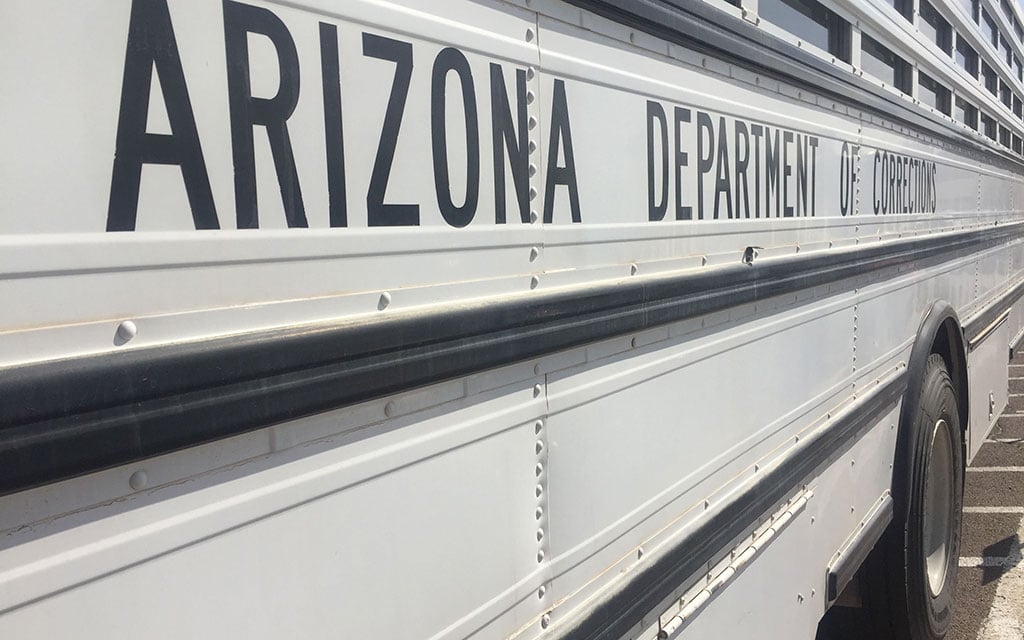
The Arizona Department of Corrections Rehabilitation & Reentry and its health care provider, NaphCare, have been under legal scrutiny as it relates to prison care and conditions. (File photo by Jenna Aronson/Cronkite News)
PHOENIX – In 2022, Judge Roslyn Silver ruled that Arizona was violating prisoner’s rights by not providing proper care and that health-care faults were causing preventable deaths in Arizona prisons. That case, Jensen v. Thornell, led to the Arizona Department of Corrections Rehabilitation & Reentry implementing changes to its quality of care up to bring it to constitutional standards via changes in staffing, higher quality physical care and access to mental health care.
However, the case didn’t end the issues. In 2023, the Arizona district court issued another injunction to speed up the process, ordering the state to improve its health-care staffing, bring in additional physicians and hit benchmarks laid out by the court. In 2024, though, the problems remain.
“They’re still enormous problems, and some of them haven’t improved at all,” said Donna Leone Hamm, director of Middle Ground Prison Reform, an Arizona-based nonprofit.
There is a stalemate between the Department of Corrections, provider NaphCare and Arizona courts. The court battle has raged for more than a decade. And in the eyes of the courts, only marginal improvements have been made.
Independent court monitor reports filed in July claim many objectives had not been met as of April. Noncompliant or overdue areas include hiring enough of psychiatric staff and additional physicians and having proper medical facilities to house no less than 200 patients. The reports also claim that the prison system is not compliant with rules about emergency response equipment, including automated external defibrillators or oxygen.
However, NaphCare claims to be making improvements on providing proper care and staffing to its facilities.
“NaphCare is continuing to innovate and enhance health-care services within Arizona prisons by enhancing the TechCare system, expanding staff training, increasing patient digital engagement, and developing specialized care programs like opioid treatment. These initiatives aim to elevate compliance and set national benchmarks in correctional health-care quality,” a NaphCare spokesperson said in a statement.
The Corrections Department began a pilot project in July at a prison in Yuma to test staffing levels and establish a plan for future staffing. However, the department has also paused hiring until contract amendments with the state have been signed.
“One of the things that the court experts told Judge Silver in their report was that there’s all this new staff that needed to be hired, and NaphCare would not do it for months because they said their contract with the state needed to be amended first before they would even try to recruit more staff,” said Corene Kendrick, deputy director of the American Civil Liberties Union National Prison Project. “And so that’s kind of a problem if the company isn’t willing to do things that ADCRR is asking them to do and that are relevant to court orders until the amendment gets them.”
The state, the department and NaphCare are still attempting to resolve all the issues by hiring staff and increasing inmates’ access to care.
“The bottom line is, on a daily basis, day to day, people are suffering because of inadequate medical care,” Hamm said. “We’ve got cancer patients. I’ve got a guy who’s had parasites all over his head and arms and in his eyes, and they’ve been ignoring the real problem for, he says, two years, and they still haven’t scheduled him for a specialist. And you can only do so much with creams and ointments.”
NaphCare has faced lawsuits across the country, including one in Arizona. In Pima County, the company has been docked around $3.1 million in financial penalties due to its failure to meet contractual obligations, according to reports from Arizona Luminaria. The 2022 per-capita deaths in the county jail were four times the national average, according to a report from the Tucson Sentinel.
“Right now, what the department is still doing is cooperating with the private health-care provider and saying, ‘OK, here’s what the court told us to do,’” Hamm said, noting that the fines NaphCare and other providers have received haven’t seemed to speed up compliance. “They’re making so much money in profits that it doesn’t hurt them to be fined, they make a sufficient profit that being fined apparently doesn’t harm their bottom line that much.”
In a document from NaphCare, the company claimed to have “successfully staffed all critical aspects of patient care” and that “the NaphCare mental health team has implemented a process to complete comprehensive mental health evaluations at reception/intake for patients transitioning from jail to prison.”
NaphCare has also implemented other programs to address Arizona health outcomes, such as a gender-identity director to provide care to transgender inmates and implementation of statewide Hepatitis C treatment, according to the document.
The Corrections Department has also reported some progress in its efforts to mitigate the issues the injunction addresses. The department declined to answer questions but, in its Jensen Injunction Progress report published in September, the department reported an increase in residential care units and employees. It has also lowered the number of people in maximum custody, Arizona’s version of solitary confinement, which has been shown to put inmates at severe mental health risks. The department has lowered the number from 356 in January 2023 to 256 in August of 2024.
A recent study from National Alliance on Mental Illness found that any time in solitary confinement increases risk of death in the first year of release, with suicide listed as the most common cause.
The court views these improvements as marginal. Silver said in March the conditions still remain “fundamentally lacking,” and improvements must be made to avoid a third contempt of court case.
The ACLU and other groups have been calling for receivership to put the care of the prisoners under the court’s authority rather than the Corrections Department.
“Over the years in the litigation, in this case, we have asked the judge to appoint a receiver to take over the management of delivery of health care to the incarcerated people in Arizona.
So far, she has not done so,” Kendrick said. “It appears that her thinking to date on it has just been that she wanted to kind of see how things went for the department and their health-care vendors to implement the reforms.”

